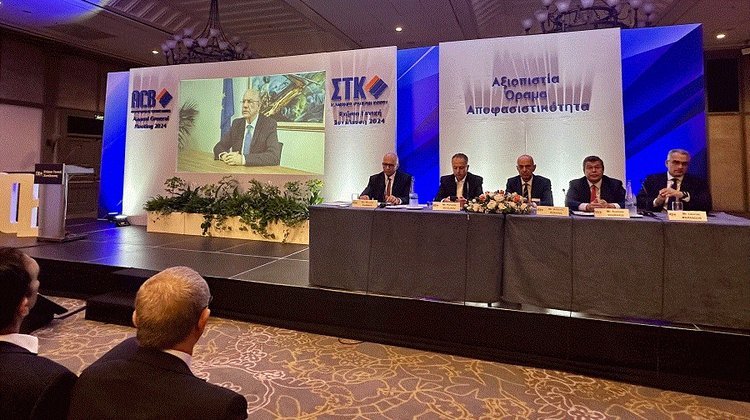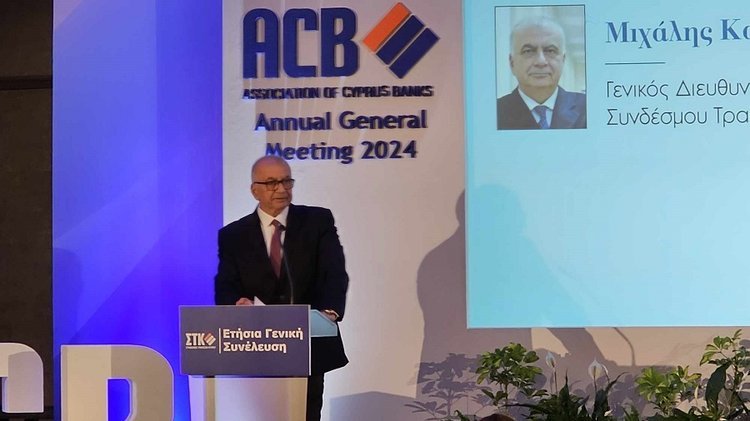AstroBank’s Aristidis Vourakis elected new Chairman of the Association of Cyprus Banks
07:11 - 19 June 2024

The CEO of AstroBank, Aristidis Vourakis, has been elected as the new Chairman of the Association of Cyprus Banks.
The Association’s AGM also saw Hellenic Bank’s Interim CEO, Antonis Rouvas, named Vice-Chairman.

(L-R) Antonis Rouvas, Association Director General Michalis Kammas, Aristidis Vourakis
In addition, the 18 June AGM saw changes made to the Association’s statute, increasing the terms of the Chairman and Vice-Chairman to two years from the previous one. This is anticipated to give them more time to familiarise themselves with their roles and set and achieve Association-related goals.
The two senior board members will now also more easily be able to represent the Association’s interest in Parliament, arrange meetings with the President of the Republic and the Finance Minister and represent the Association, together with the Director General, at various meetings.
Following his appointment, Vourakis stated, "Following my election to the chairmanship of the Board of Directors of the Association of Cyprus Banks, I am committed to substantial, effective and beneficial cooperation of the banking sector with the aim of financial stability, economic development and social welfare".
In turn, the newly elected Vice-Chairman Antonis Rouvas noted, "We look forward to close cooperation with all economic entities in order to strengthen the banking system with the aim of developing the country's economy and the well-being of society.
From the floor of the Association of Cyprus Banks’ Annual General Meeting, meanwhile, state officials issued new warnings regarding the de-escalation of lending rates and for the reduction of the gap between deposit rates of banks.
This year's meeting took place with the Cypriot banking sector at its best level since the financial crisis of 2013, with high capital ratios and high profitability in the wake of high interest rates, something all the speakers pointed out.
House President calls on banks to consider "additional solutions"
In her address at the AGM, House President Annita Demetriou referred to the high levels of interest rates in the consequent increased cost of financing, combined with the increased cost of production and the compressed real disposable income of households, which "constitutes an additional critical parameter for the current financial situation of households and businesses."
"In this light, it is extremely important to consider additional solutions, especially regarding the issue of high interest rates, to support specific groups of creditworthy borrowers to avoid, on the one hand, the creation of a new chain of non-performing loans and to provide relief to businesses and households within the present context of generalised increased prices on the other hand," stated Demetriou. Her speech was read out by DISY MP Savia Orphanidou.
Demetriou also pointed out, however, that "the robust banking sector of Cyprus has in recent years demonstrated, remarkable resilience to crises and challenges, but also an impressive ability to adapt to increasingly demanding regulatory and legislative arrangements, especially in the context of obligations arising at the European and international level."
She also referred to new challenges, such as the green transition and digitisation, to emphasise that "it therefore becomes clear that challenges and risks for Cypriot banks and the Cypriot economy as a whole still exist, which not only does not allow for complacency but instead requires careful and financially rational actions."
Finance Minister says Cyprus banking system is in strongest position in a decade
In his own greeting, the Minister of Finance Makis Keravnos via a video message, since he was in Luxembourg, welcomed the fact that the banking sector in Cyprus is in its strongest position in a decade with strong capital ratios, since, as he said, "the rise of interest rates has strengthened the profitability and capital position of banks even as the level of interest rates creates challenges for the real economy and households."
Without ignoring the fact that the rise in interest rates creates potential risks for banking institutions since now households and businesses are faced with higher costs of servicing their loans, Keravnos recalled that "in this context, as Minister of Finance, respecting the independence of Central Bank of Cyprus I have made several recommendations to the banking institutions to re-evaluate the interest rate policy."

He also acknowledged that "our interventions have brought about some marginal results since the banks have adopted some positive measures in terms of absorbing the increased costs from the increase in interest rates as well as in terms of the formation of deposit rates."
Addressing the banking institutions, the Minister of Finance emphasised that "I expect that we will see drastic movements in two directions: firstly, the reduction of the gap between deposit and lending rates and secondly, no repetition of interest rate increases but a substantial course of de-escalation of lending rates, especially after marginal reduction of interest rates by 0.25 points by the ECB."
"I want to convey to our banks in the most intense way the cries of anguish of our households, businesses and the common component of the political perception of the level of lending rates which is one of the most serious inhibiting factors in the development of the economy and in dealing with social problems such as housing,” the Finance Minister continued.
Keravnos referred to NPLs, noting a significant reduction in them on the banks' balance sheets but going on to point out that "however, the fact remains that NPLs in the real economy are maintained at high levels, creating problems in the smooth functioning of the economy and especially businesses."
Concluding, the Minister of Finance called on banks, credit acquisition companies and credit management companies "to continue efforts and positive approaches to have a vertical reduction of NPLs in the real economy, which will result in the mutual benefit of all since this will give a significant boost to the economic development."
Central Bank Governor reminds banks of the importance of a good reputation
In his own speech, the Governor of the CBC, Christodoulos Patsalides, repeated what he had also pointed out in the first press conference, which he granted after assuming his duties, regarding the reputational risk associated with mitigating society's discontent arising from the pricing policy of banks.
“One final risk aspect I would like to address is reputational risk. Banks' pricing and business activity should incorporate the element of social sensitivity, to mitigate society's dissatisfaction," he stressed.
Patsalides hailed the decisive restructuring, resilience and stability that the sector has shown in recent years, saying that "significant capital reserves as well as excess liquidity provide the guarantees for the banking sector to manage possible future crises, even large-scale ones.”

Noting that trade wars and the possibility of the fragmentation of the international economy may have negative effects on the international economy, Patsalides underlined: "Consequently, the fortification of the banks and the stability of the country's financial environment, which has strengthened significantly in recent years, must continue."
However, Patsalides also acknowledged the "increased difficulty for borrowers to repay loans" after the EU raised interest rates from mid-2022, noting however that the asset quality of the banking sector has not deteriorated.
"However, taking into account the Non-Performing Loans managed by credit buyout companies, the volume of NPLs remaining in the real economy is still large," he said, pointing out that according to European forecasts, asset quality is expected to deteriorate in 2024.
In this context, the Governor of the CBC called on all those involved to take advantage of the amendments made in the context of divestments and the increased powers of the Financial Ombudsman.
From the banks’ point of view, he added, "it is of the utmost importance to identify customers who are experiencing financial difficulties in a timely manner in order to find a sustainable loan repayment plan. Doing so limits costs for both banks and borrowers while avoiding the application of more drastic measures."
At the same time, Patsalides referred to additional risks, beyond traditional risks such as climate change and risks related to technology, such as cyber security.
Panicos Nicolaou suggests Cyprus will reduce lending rates faster than wider Europe
The outgoing Chairman of the Association, and CEO of the Bank of Cyprus, Panicos Nicolaou referred to the ECB's decisions to reduce its key interest rates, saying that the rate of reduction of lending rates in Cyprus will be faster, since most loans are at floating rates, which are more sensitive to monetary policy decisions.
"The rate of reduction of interest rates in our country will be faster than the rest of Europe, as was done respectively in their rise," he said.
Nicolaou emphasised that in an environment of intensifying geopolitical instability and uncertainty, Cypriot banks support the country's development, progress and smooth transition to the new green and digital era on a practical level.

He referred to the support of consistent borrowers who faced the crisis of inflation and interest rate hikes by the ECB, saying that the restructuring and renegotiation of terms of a large number of household and business loans, reached €4.5 billion, between 2022 – 2023 and is continuing. He also said that Cypriot banks granted new loans of almost €3.3 billion in 2023, while in the first four months of 2024 net new lending has reached almost €1.1 billion.
In relation to bad loans, Nicolaou said that the NPL ratio fell to 7.3% of total loans in the first quarter of 2024, while he expressed hope that the new framework for divestments "will finally be allowed to work without new suspensions."
"The banking sector inspires confidence and stability in a period characterised by instability," said Nicolaou, giong on to add that "the Banking Association is a prudent, cool and constructive partner of the state at a time when voices and sometimes populism are winning ground in the political process and which sooner or later lead to undesirable results."
He pointed out that the Association had to manage "scenarios harmful to the profile of our country such as the possibility of taxation of the so-called windfall profits of the banks."
"It is not possible to promote your country as an investment destination and at the same time tax foreign investors triple (in addition to the tax on deposits that has been in effect since 2012) because they happen to have invested in banks supporting the country in difficult times," he stressed.
Association General Director says Cyprus' banking system has become a point of reference
The Director General of the Association of Cyprus Banks, Michalis Kammas, emphasised that in recent years, despite the successive crises, some of which continue to this day, the banking sector of Cyprus is a point of reference through its stability, adaptability, flexibility and the determination it displays.

He referred to a "puzzle" of challenges and crises such as the pandemic, war conflicts, intense inflationary pressures, geopolitical upheavals that had direct effects on the economy, the disruption of global trade, as well as interest rate hikes by Central Banks to limit the inflation.
"In this environment, our banks are part of the solution to any problems and not part of them," he stressed, adding that "the banks have taken a series of actions to support and relieve society from interest rate increases, which have been the main tool of Central Banks to rein in inflation."
(Source: InBusinessNews)

